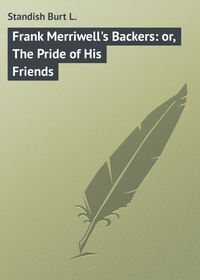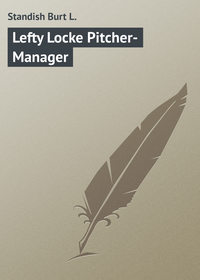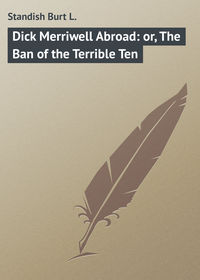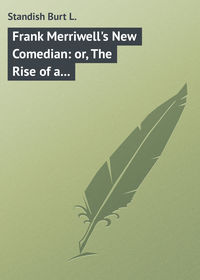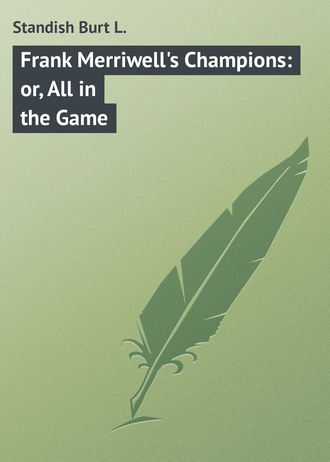 полная версия
полная версияFrank Merriwell's Champions: or, All in the Game
The spectators noticed this, and their clamor increased. One solemn-looking man jumped to the top of a tall stump and capered like a schoolboy, while a couple of Glendale’s severest old maids, whom nobody supposed could be moved to any show of emotion by such a scene, were actually seen to hug each other and shed tears.
Inch by inch, foot by foot, and yard by yard, Frank gained on his opponent and bitter enemy. His head drew alongside of Hammond’s thrashing heels, forged up to Hammond’s side, came up to Hammond’s shoulder and neck, then passed him.
Hammond gave his antagonist a frightened glance, and tried to swim faster, seeking to regain his lost ground by another spurt. But he had seriously winded himself, and he found the feat impossible.
And still the crowd yelled, and whooped, and fluttered handkerchiefs, and thumped the benches.
Craig Carter had long ceased his insane antics. His face wore a look of anxiety.
Suddenly, as the swimmers were drawing past a point that jutted out into the lake, a dog sprang into the water and paddled toward them. It was Craig Carter’s spaniel. It recognized him as he sat in the boat, and was anxious to join him. The boat was beyond the swimmers, and the dog, in attempting to reach it, swam against Merriwell, and almost lost him his position. Frank lifted himself and gave the spaniel a heavy shove, which caused it to sink beneath the surface.
The sight threw Craig Carter into a rage. He was already in a desperate mood, and now he seemed to become furiously insane.
Merriwell was still in the lead, and again swimming. White and panting, Carter rose to his feet, lifted an oar with both hands and struck at Frank.
It was a cowardly blow, and brought cries of “Shame!” from those who witnessed it.
But it did not reach Frank. He dived like a flash, and the oar struck harmlessly on the water.
When Frank came up, he was seen to be swimming neck and neck with Ward Hammond, and the goal not a dozen yards away.
Then pandemonium again broke loose on the shore.
Inch by inch, and foot by foot, Frank again drew ahead of his antagonist. The crowd yelled like mad. A dozen men crowded to the water’s edge to take him by the hand, for they saw that he was to be the winner.
In vain Ward Hammond threshed and flailed. His wind and strength were gone.
Merriwell reached the landing three yards in the lead, and was immediately drawn out on the boards.
Then, all wet as he was, he was hoisted to the shoulders of his admirers – to the shoulders of men who loved pluck and fair play – and borne around the boathouse, while they bellowed at the top of their lungs:
“See, the conquering hero comes!”
After that there were exhibitions of fancy diving and swimming by Frank Merriwell and others, which were not taken part in by the disgruntled Hammond, however, and by only a few of his intimate friends.
Thus the swimming ended, to the entire satisfaction of those who had waited so long and so patiently for its beginning.
“And to-morrow comes that mountain climb,” said Merriwell, speaking to Colson, when they were again in the dressing-room. “I wonder if Hammond will be as palpitatingly anxious for that as he was for this swim?”
CHAPTER VIII – A FAIR GUIDE
The mountain chosen for the climb was one of the wildest and ruggedest of the Blue Ridge range. It rose just beyond Blue Mountain, whereon Hammond and his friends had their summer camp, and its dark shadows fell afternoons into the hollows and dells where clung the cabins of the poor whites who recognized the leadership of Bob Thornton.
“It’s not a pleasant feat to contemplate,” grumbled Bruce Browning, looking from the door of the cottage he occupied in company with others, and staring up at the half-naked heights that thrust themselves skyward. “It’s much prettier at a distance. I haven’t any sympathy for these fellows who form Alpine clubs, to bury themselves in snowdrifts and break their necks in crevices, when they might be staying at home, sensibly enjoying themselves.”
“I don’t doubt you’re really wishing for a rattling good chill,” laughed Sep Colson. “It would be such an excellent excuse to laze all day in that hammock.”
“Hardly that,” grunted Bruce. “A fellow might as well wish he’d break an arm to get out of the job of sawing a little wood. But, seriously, doesn’t it seem to you a great waste of energy for a mighty little return to go panting up that mountain, trying to beat a lot of other fellows who haven’t any more sense than you?”
“No more of that,” cried Rattleton, coming up at that moment, and overhearing the question. “You’re the worst grumbler on the face of the footstool, Browning. I should think you’d be just dancing with joy this morning to think how you slipped through that scrape down at Thornton’s. And if there is anything prettier than that mountain, with the morning mists creeping around it, I don’t know what it is.”
“Oh, it’s pretty enough – at a distance!” growled Bruce. “And, of course, I’m going with you, even if I haven’t got over that headache yet. You couldn’t get along without me.”
“Roight yez are in thot!” declared Barney Mulloy, coming, with a shining face, from a dip in the lake. “Indade, we couldn’t git on widout yez, an’ it’s moighty bad we filt whin we thought ye wur dead.”
After solemn consultation over the matter, it had been determined to keep Browning’s adventure a close secret. It would be difficult to prove anything against either Sam Turner, Ward Hammond or Bob Thornton, and the effort would necessarily involve Nell Thornton, whom they naturally wished to protect, and not injure.
Bob Thornton had not been seen, and it was reasonable to suppose that, Turner’s attempt having failed he was keeping himself out of sight, and would continue to do so until the supposed revenue officers had disappeared from the neighborhood.
The starting point of the climb was a glade at the foot of Bald Mountain, and the goal a flat rock beyond the mountain’s outthrust shoulder, both the shoulder and the rock being well-known landmarks.
A score of men from the summer cottages in the village were at the starting point when Merriwell’s party arrived, and two had been sent on some time before to station themselves at the rock, that the time occupied in the ascent and the victors in the contest might be accurately determined.
“Hammond’s fellows don’t seem to be here,” declared Rattleton, stabbing his alpinstock in the ground, and looking about.
“I don’t doubt they will come all right,” Merriwell hastened to say.
“Meebe dey ain’ got ober shoutin’ ’bout dat swim yit!” observed Toots, a smile of pleasurable recollection lighting his ebony face.
“Here they come, just the same,” announced Bart Hodge. “They’ve got sand, and that’s something to praise them for. It’s my opinion, too, that they’ll give us a hard climb, for most of them are familiar with these mountains and hardened to such work.”
Ward Hammond was diplomatic enough on his arrival to try to conceal the intense hatred he felt for Frank Merriwell. He recognized that Craig Carter had made a sad mess of it by striking at Frank with the oar. Even Hammond’s friends had denounced this as a criminal and cowardly piece of work.
As for Craig, he held himself aloof from the joking and conversation, and was not without a fear that Merriwell would seek to punish him yet for his contemptible conduct.
But Merriwell’s victory in the swimming match had been so complete that he chose to pass the matter by without comment, instead of dealing blow for blow.
The starter looked at his watch.
“The party, or any member of either party, that reaches the rock first is to be counted winner. The object is to reach the rock in the shortest possible time.”
Browning glanced up at the mountain, and groaned, as Merriwell grouped his party, and the boys broke into a hearty laugh.
“It is now nine o’clock,” said the starter, when all were ready. “You ought to do it in two hours, or less. I won’t attempt to give you any advice. You know what’s before you. Go!”
Ward Hammond led off at a sharp run, swinging his alpinstock and taking the path that led toward the right, while Sep Colson, who had been chosen to lead the Lake Lily Club, because of his greater familiarity with the ground to be covered, swung into the path that wound around the mountain on the left.
“It’s a little farther,” he said, “but the traveling is easier, and we’ll make better time.”
Frank Merriwell crowded close to Colson’s heels, and others fell in behind him, with Hans Dunnerwust bringing up the rear.
“Yes, this is what I call fun!” grunted Browning, as a bowlder slipped under him and he half fell.
“Be afther takin’ a little more quoinin’ to roise yer spairts,” advised Barney Mulloy, with a grin.
When more than half a mile had been passed over, and they were jogging down a declivity at a lively pace, Colson stopped so suddenly that Merriwell fairly tumbled over him.
“What is it?” Frank questioned.
“Look there! There’s Nell Thornton waving to us.”
“She wants to speak to us,” said Rattleton, looking in the direction indicated by Colson’s pointing finger.
Bruce straightened up and forgot to grumble, when he saw the slim form of the girl descending the rocks.
She was letting herself down a precipitous bluff, clinging to the vines and bushes.
“She can get over places I shouldn’t care to try,” declared Bruce, with an admiration that was akin to enthusiasm. “I wonder what she wants?”
“We shall find out very soon now,” said Merriwell. “It won’t take her long to reach us.”
Dropping to the level ground, Nell came shyly toward the party, with evident embarrassment.
“Do you uns want ter beat them thar other fellows bad?” she asked.
“The worst kind,” declared Rattleton.
“Thar’s a way it kin be done,” she said, with kindling glance, “ef so be ez you uns air good climbers. Thar’s a path which the mounting men foller when they air in a hurry, sech o’ them ez knows ’bout it. I kin show it ter ye, though ef dad knowed I done it he’d jes’ nacherly kill me!”
“You may show it to us with perfect safety,” promised Merriwell.
She gave a quick glance toward Browning, as if for confirmation of the promise.
Browning flushed.
“As Mr. Merriwell says, the secret will be perfectly safe with us, Miss Thornton,” touching his cap. “You may rely on it!”
“I kinder sorter wanted you uns ter beat ’em,” she confessed, “an’ it’ll pleasure me ter help you ter do it. You uns’ll hev ter shin up that thar bluff somehow er ’nuther ter git a start.”
She pointed to the precipice down which she had swung, and Browning gave an inward groan.
“Heavens!” he inaudibly grumbled. “She must want to see me killed. Those vines will come down like cotton strings when I put my weight on them.”
Merriwell nodded, and the girl led the way to the bluff.
“Take holt o’ that thar saplin’ an’ that’ll holp you ter reach the cedar. Then grab them vines an’ git along ez best ye kin. Them vines’ll bear a good heft, an’ ye needn’t be skeered uv ’em.”
Having said this, with pointing finger, she stepped aside. Frank Merriwell grasped the slim hickory and drew himself up to the scrubby cedar that here thrust its roots into a crack in the ledge.
He was followed by Colson and Rattleton. Then came Bart Hodge and Jack Diamond.
The climb was not so difficult as it looked. Some of the smaller vines broke under the weight of Browning, and of Ephraim Gallup, but in a comparatively short time all were at the top of the bluff.
The girl swung herself up after them, and pointed to a dim path leading through a thicket of laurel straight toward the frowning cap of the mountain.
“Thar’s yer way!” she whispered. “I see ye’ve got a rope fer ther bad places. Two or three uv ’em’ll maybe hump ye, but I’m sure you uns, by holpin’ each other, kin make it. An’ it’ll save ye nigh about half the distance.”
“Thank you,” said Frank, as she turned away. “You have placed us under great obligations.”
This time Merriwell took the lead, plunging into the laurel, for the route was an unknown one to all. He hurried forward as rapidly as the ground would admit.
A number of hogs of the razorback variety leaped up in front of him and scurried out of sight.
“Look out that you don’t get bitten,” shouted Rattleton, with a laugh. “Those are wild hogs, you must understand, and you’d better not crowd them.”
The hogs looked fierce enough to justify Rattleton’s assertion.
“A boar hunt in these hills wouldn’t be bad,” said Hodge. “One of those fellows had tusks like razors.”
They soon found abundant use for the rope, of which Nell Thornton had spoken, and for the stout alpinstocks they had provided as well. The way was rough and steep, and they quickly came to a series of benches, where the rope was found invaluable.
“This is what I call tough,” grunted Browning, mopping his heated face at the end of one of these climbs.
“Cyant hab no chillins, an’ fevah, dough, Mistah Browning, when you sweat dat way,” laughed Toots. “Dis clamb is gwan ter cure yeh.”
“Or kill me!” Bruce growled.
“I wonder how these other fellows are getting on?” said Hodge.
“I don’t doubt they’re going faster than we are,” answered Merriwell. “But I’m depending on the judgment of that girl, and you know that we have the best of authority for believing that the race is not always to the swift.”
“Or the battle to the strong!” chimed in Diamond, completing the quotation.
“Ha! ha! ha!” laughed Rattleton.
“Mr. Rattleton, what are you grinning about now?” queried Hodge.
“I was just thinking that if the battle were always to the strong, what a fight a polecat would put up!” answered Rattleton, with another shout.
“I believe, by chaowder, they air the strongest things on earth,” declared the boy from Vermont, with a smile. “I tried to poke one out of dad’s old barn once, an’ I thought it would lift the roof, b’gosh!”
Higher and higher the dim path led, zigzagging at times, crossing perilous crevices, which they were forced to leap, dipping into narrow gorges, through which ran icy streams of water from hidden springs.
“I tell you we’re nearing the top!” cried Rattleton, with a burst of enthusiasm.
Merriwell looked at his watch.
“We’ve already been an hour on the way,” he declared. “That starter thought the climb could be made in two hours. We may have to cross that rocky shoulder yet.”
“No, we shall not have to cross it,” said Hodge. “I caught a view of the path from that other slope a while ago, and it swings under the point instead of over it.”
“Hello! I don’t know about this!” cried Merriwell, coming to a full stop at another bend.
The path ended at the foot of a flat rock that rose upward like the wall.
“We’ve got to get up there somehow,” asserted Diamond. “The path will be found again at the top.”
Browning stepped forward.
“There’s only one way, fellows. I understand now just what Nell meant when she said we’d have to help each other. Climb up on my shoulders here, Gallup. You’re the longest and can reach that notch with your hands. Perhaps Hans had better go next.”
“By gum! he ain’t here!” snorted Gallup, staring around.
“He must have got tired and stopped,” said Merriwell. “We can’t wait for him. We may lose the race if we do. And it will punish him right, when he comes to this place and finds he can’t get up.”
“We’ll come back and lower the rope for him,” said Browning, putting himself in position against the wall of rock. “As Merriwell says, we haven’t any time to lose.”
Gallup glanced quizzically upward, then gave his hand to Merriwell, and was assisted to Browning’s broad shoulders.
“No fooling,” grunted Browning. “If I’ve got to play the strong man in this game of high and lofty tumbling, I want you fellows to get a move on you. Gallup alone feels as if he weighs a ton.”
Barney climbed to Gallup’s shoulders, and Merriwell came next, carrying the rope.
Standing on Barney’s shoulders, he was able to grasp the branches of a tree that hung down at that point, and scrambled quickly on to the top of the bluff.
“Yes, the path is up here,” he shouted back, letting down an end of the rope. “Put that loop around your waist, Diamond, and I’ll pull as you climb. You’ll find it will be a good deal easier.”
“You’d better hurry on without me,” advised Browning, when all were at the top but himself. “You’ll lose valuable time trying to get me up there, and it’s not necessary.”
“We’ll have you up in just a moment,” promised Merriwell. “Take a seat in that loop. You won’t need to do much, only keep yourself from scratching scales off the rock. There’s enough of us up here to lift you, and the rope is strong. Bring up the alpinstocks that were dropped, too. We may need them again.”
“Well, if I must, I must!” grumbled Browning, who would not have been sorry if they had gone on without him. “Haul away. And remember that my life isn’t insured.”
It was no easy task to lift him to the top, but it was accomplished without mishap.
“No Hans in sight yet,” said Merriwell.
Rattleton, who was running up the path, was heard to give a whoop.
“Fellows, we’re right there!” he announced, hastening back to bear the glad tidings. “I took a peep through the bushes, and the rock isn’t a hundred yards away. I saw the men who were sent up here standing by it, and there wasn’t another soul in sight.”
Merriwell looked at his watch again.
“An hour and twenty minutes since we started. Lead on, Rattleton. If you’ve seen the rock, you may act as guide. We’re after you.”
Rattleton dived into the bushes again with a whoop, closely followed by Merriwell, who saw in a few moments that Harry was right.
The goal was just before them, with only the timekeepers there, and they had won the race!
CHAPTER IX – THE VALIANT DUTCH BOY
Where was Hans?
The Dutch boy, who by reason of his roly-poly body and fat, short legs, was not well adapted to mountain climbing, was much fatigued by the headlong haste with which his friends proceeded.
“Some volks peen plame vools enough to call dos sbort,” he secretly grumbled, panting along at the heels of the procession. “Maype it vos sbort vor me, alretty, py shimminy! put don’t you pelief me! Ven I vos caughd py a voolishness like dot again, I hope I vill gick someboty.”
He was stumping along in this manner, dropping gradually behind, when at a short turn in the path his friends vanished. At the same moment a pebble that had found its way into one of his shoes began to cut his foot so that he could hardly walk.
“Wa-ow!” he gurgled. “Dot feel shust like I pit a snake by. Dunder and blitzens! Dot toe vos cud off, I pelief me!”
He stared along at the dim path and at the bushes beyond which he heard the voices of his friends, then plumped himself down on a rock and began hastily to unloose the shoe lace.
“Uf I get oudt uf dis scrabe, anudder vun von’t go into me right avay, I dell you!” he muttered. “I haf to haf a boultice vor dot toe, I pelief me, der vay id veels. Waow!”
He pulled off the shoe with a jerk, felt of the injured toe, and gave the shoe a shake to remove the pebble.
It rolled out, a tiny thing, not larger than a small shot, but with a cutting edge almost as hard as a diamond.
“Some liddle dhings make a pigger vuss dan – ”
He cocked an ear around, and listened for the voices, but they were no longer to be heard.
“Shimminy Ghristmas! Dose vellers gid along like shain lighdnings. I vos half to hurry uf dey gacht me oop, I tolt you!”
He crowded his foot back into the shoe, hurriedly laced and tied it, then picked up his alpinstock and set his short legs in motion.
But it was a hopeless chase. They were swinging on at a swift pace, and had gained so much that it was quite impossible for the Dutch boy to come up with them.
Discovering this, he became terrified.
“Vot uf dose shinermoons shoult pe hiding dese pushes behint, und kilt myselluf mit a club der head ofer?” he panted, staring about in wild-eyed expectancy.
He heard a movement in the bushes, which almost raised the hair on his head. The brush cracked. The sound came toward him.
He dropped his alpinstock and turned to run, but his short, fat legs became so weak they would not sustain him.
He dropped to his knees with a bellow of fright, and pleadingly threw up his hands.
The brush cracked again, sending cold shivers up the Dutch boy’s back, and a lean sow, followed by three or four thin, sharp-backed pigs, came into view.
Hans scrambled up, with a screech of fear.
“Vilt hocks!” he squawked. “Shimminy Ghristmas! I vos deat alretty yet!”
The sow ridged the rough bristles along her spine and made a sound which Hans thought her battle cry.
He gave another squawk and dived for the nearest tree. Into its low branches he scrambled, throwing his feet across a bough and pulling himself by his hands.
As it chanced, the tree was in the direct line of the sow’s flight. She dashed toward it, bringing another squeal of fear from Hans, and the pigs scampered at her heels.
While hanging in this inverted position, with his cap gone and his pockets upside down, some peanuts that Hans had thrust into a pocket to munch on the mountain climb, dropped out to the ground.
One of the pigs saw and scented them. Its chronic hunger overcame its fright, and, while its mother and the other members of the porcine family bounded on into the depths of the laurel it stopped and began to munch the peanuts.
“I vos a deat mans!” gurgled Hans, fairly paralyzed by terror. “He vos going to ead up dose beanuds und my gap, und den he vill glimb dese dree ub und I vill ead heem! Hel-lup! hel-lup!”
Now and then a peanut spilled out of the pocket, and when the pig had devoured all, it looked up at the peanut fountain for more, placing itself directly under Hans with its mouth expectantly open.
“Oh, I vos deat! I vos kilt!” he howled. “Someboty gome guick und shood me, so dot I von’t ead mineselluf ub!”
It was impossible for him to climb higher, both on account of his weakness, and the springy nature of the bough, and he was dimly conscious of the fact that he could not hold on much longer.
Ordinarily, the pig would have fled from him, but its hunger now caused it to half lift itself on its hind legs and stretch its long nose up toward him.
In that moment of supreme terror the Dutch boy’s strength entirely deserted him, and he fell from the bough, striking the pig directly in the center of the back.
It went down, with a squeal. Hans rolled quickly over and tried to scramble to his feet. He could do nothing, however, but thresh his heel in the air and bellow for assistance.
After a while it began to dawn on him that the dreaded monster was not devouring him alive, as he had fully expected, and that, since his fall, he had not heard a sound, except such as he made himself.
“Id vos skeert me avay,” he thought, stopping his flailing heels and turning his head slowly to the point where the ravenous beast might be expected to be seen.
He lifted himself slowly on his hands and stared, his eyes rounding out in astonishment.
The pig lay on the ground as if dead.
“Id vos maging a vool uf me, maype,” he reflected. “It vos shust agting like I vos deat. Id shust vant to play mit me, like I vos a gat und id vos a mouses.”
Still, when the pig maintained that strange silence, Dunnerwust’s courage began to come back.
He lifted himself still higher, ready to drop down and play the game of “’possum” for all it was worth if the pig showed signs of life and pugnacity. Still, the pig did not move.
Hans rolled over, and slowly got on his hands and knees, then lifted himself to a standing position, ready to run if the pig so much as moved.
“It maype is sdill voolin’ me, alretty yet!” he gurgled. “Dere vos no tepending on me somedimes. I haf heert apout dose vilt peasts dot blay sleeby to vool demselves like dot!”
But the pig was dead. There could be no doubt of it, and if Hans had not been insane from fright, he must have discovered the fact sooner. He had struck with all his weight, and that was not small, in the middle of the pig’s curved spine, and had snapped it as if it were a pipestem.
“Whoop!” he yelled, as soon as he was sure the pig was dead. “Dot vos a recklar knock-oud, you pet me! He vos kilt me der virst lick!”




